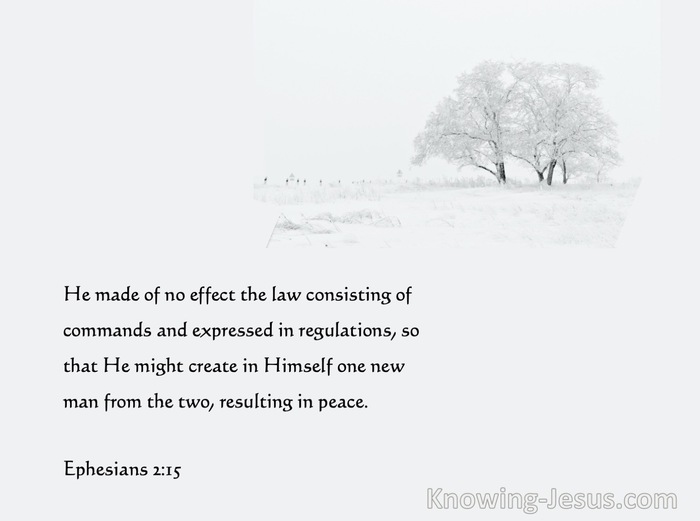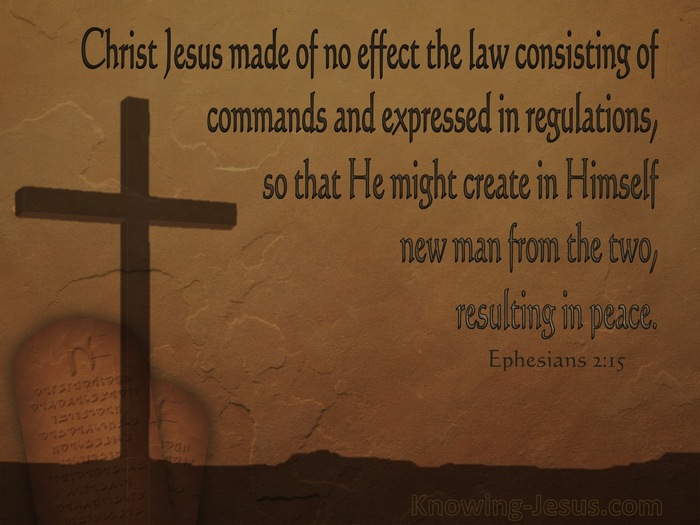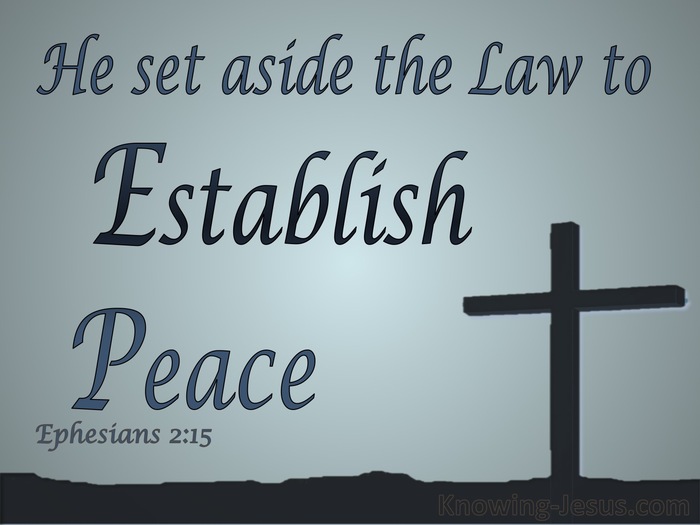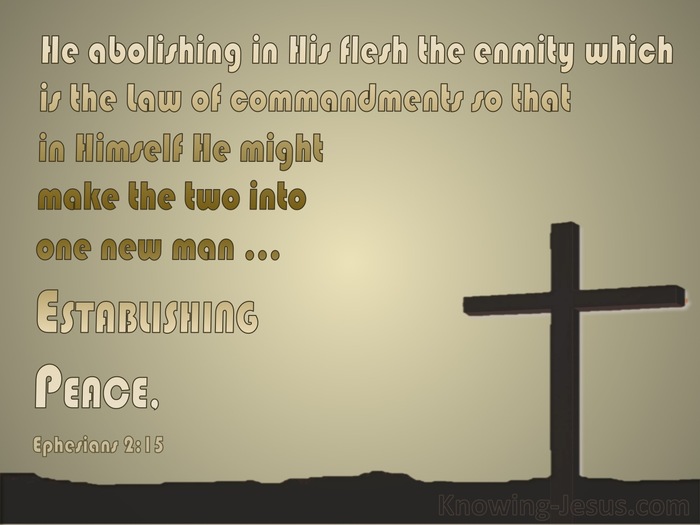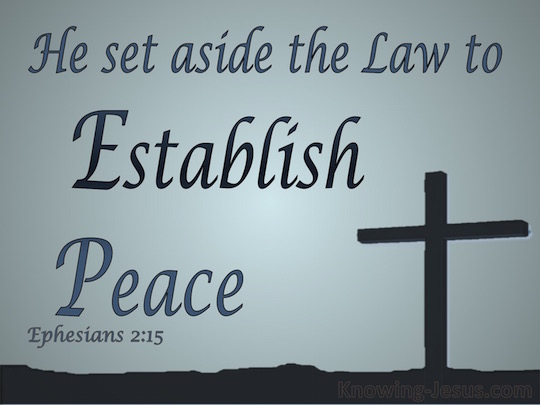Parallel Verses
Godbey New Testament
having destroyed the law of commandments in ordinances, through his flesh, the enmity, in order that He might create the two in himself into one new man, making peace;
New American Standard Bible
King James Version
Having abolished in his flesh the enmity, even the law of commandments contained in ordinances; for to make in himself of twain one new man, so making peace;
Holman Bible
He made of no effect the law consisting of commands and expressed in regulations, so that He might create
International Standard Version
He rendered the Law inoperative, along with its commandments and regulations, thus creating in himself one new humanity from the two, thereby making peace,
A Conservative Version
having abolished in his flesh the enmity--the law of the commandments in ordinances--so that he might create in himself the two into one new man, making peace,
American Standard Version
having abolished in the flesh the enmity, even the law of commandments contained in ordinances; that he might create in himself of the two one new man,'so making peace;
Amplified
by abolishing in His [own crucified] flesh the hostility caused by the Law with its commandments contained in ordinances [which He satisfied]; so that in Himself He might make the two into one new man, thereby establishing peace.
An Understandable Version
by abolishing in His fleshly body the [entire Jewish] law of commandments contained in decrees. [This was] so that He could create in [unity with] Himself one new person [i.e., the church] out of the two peoples [i.e., Jews and Gentiles], thereby bringing about peace [between them].
Anderson New Testament
having abolished, in his flesh, the cause of enmity, the law of commandments in ordinances, that he might, by himself, form the two into one new man, thus making peace;
Bible in Basic English
Having in his flesh put an end to that which made the division between us, even the law with its rules and orders, so that he might make in himself, of the two, one new man, so making peace;
Common New Testament
by abolishing in his flesh the hostility, which is the Law of commandments and ordinances, so that he might create in himself one new man out of the two, thus making peace,
Daniel Mace New Testament
(which kept us at variance) by abolishing the dogmatical injunctions of the law, that having made the peace, he might incorporate the two into one new body under himself;
Darby Translation
having annulled the enmity in his flesh, the law of commandments in ordinances, that he might form the two in himself into one new man, making peace;
Goodspeed New Testament
and through his human nature put an end to the feud between us, and abolished the Law with its rules and regulations, in order to make peace and create out of the two parties one new man by uniting them with himself,
John Wesley New Testament
having broken down the middle wall of partition, Having abolished by his flesh the enmity, the law of commandments, through his decrees, that he might make the two one new man in himself, so making peace:
Julia Smith Translation
The enmity in his flesh, the law of commands in enactments, having left unemployed; that he might create in himself one new man, making peace;
King James 2000
Having abolished in his flesh the enmity, even the law of commandments contained in ordinances; to make in himself of two one new man, so making peace;
Lexham Expanded Bible
invalidating the law of commandments in ordinances, in order that he might create the two in himself into one new man, [thus] making peace,
Modern King James verseion
having abolished in His flesh the enmity (the Law of commandments contained in ordinances) so that in Himself He might make the two into one new man, making peace between them;
Modern Spelling Tyndale-Coverdale
and hath also put away, through his flesh, the cause of hatred - that is to say, the law of commandments contained in the law written - for to make of twain one new man in himself, so making peace.
Moffatt New Testament
in his own flesh he put an end to the feud of the Law with its code of commands, so as to make peace by the creation of a new Man in himself out of both parties,
Montgomery New Testament
In his own body he abolished the cause of our enmity, the law of commandments contained in ordinances, in order to make the two into one new man in himself, so making peace.
NET Bible
when he nullified in his flesh the law of commandments in decrees. He did this to create in himself one new man out of two, thus making peace,
New Heart English Bible
having abolished in the flesh the hostility, the law of commandments contained in ordinances, that he might create in himself one new man of the two, making peace;
Noyes New Testament
having abolished in his flesh the law of commandments contained in ordinances; that he might create of the two one new man in himself, thus making peace,
Sawyer New Testament
the enmity, and abolished by his flesh the law of commandments [consisting] of ordinances, that of the two he might create in himself one new man, making peace,
The Emphasized Bible
The enmity, in his flesh - the law of commandments in decrees - bringing to nought, - that, the two, he might create in himself, into one man of new mould, making peace.
Thomas Haweis New Testament
destroying the enmity in his flesh, even the law of precepts, in ordinances, that he might from the two create in himself one new man, making peace,
Twentieth Century New Testament
And in his human nature put an end to the cause of enmity between them--the Law with its injunctions and ordinances--in order to create, through union with himself, from Jew and Gentile, one New Man and thus make peace.
Webster
Having abolished in his flesh the enmity, even the law of commandments contained in ordinances: to make in himself of two one new man, so making peace;
Weymouth New Testament
by setting aside the Law with its commandments, expressed, as they were, in definite decrees. His design was to unite the two sections of humanity in Himself so as to form one new man,
Williams New Testament
through His human nature He has put a stop to the hostility between us, namely, the law with its commands and decrees, in order to create one new humanity out of the two parties and so make peace through union with Himself, and in one body
World English Bible
having abolished in the flesh the hostility, the law of commandments contained in ordinances, that he might create in himself one new man of the two, making peace;
Worrell New Testament
having abolished in His flesh the enmity, even the law of commandments expressed in decrees, that He might make the two one new man in Himself, making peace,
Worsley New Testament
having abolished in his flesh the enmity, even the law of commandments contained in ordinances, that He might form the two into one new man, in Himself, so making peace;
Youngs Literal Translation
the enmity in his flesh, the law of the commands in ordinances having done away, that the two he might create in himself into one new man, making peace,
Themes
The atonement » Reconciliation to God effected by
Ceremonialism » Laws of, abolished
Christ, the mediator » In virtue of his atonement
Circumcision » Abolished by the gospel
New creature » The believer as a
Law » Christ being the end of the law
Law » Bondage of » Ceremonial abolished in Christ
Law » Bondage of » Insufficient
Ordinance » Insufficiency of, for salvation
spiritual Peace » Is through the atonement of Christ
Reconciliation » Jesus Christ reconciling man to God
Reconciliation » Between God and man
The bible » The law part of » Ceremonial abolished in Christ
Topics
Interlinear
Katargeo
En
ἐν
En
Usage: 2128
heautou
References
American
Easton
Fausets
Word Count of 37 Translations in Ephesians 2:15
Prayers for Ephesians 2:15
Verse Info
Context Readings
Jewish And Gentile Believers United In Christ
14 For he is our peace, the one having made both one, and having broken down the middle wall of partition, 15 having destroyed the law of commandments in ordinances, through his flesh, the enmity, in order that He might create the two in himself into one new man, making peace; 16 and that he may reconcile both in one body to God through the cross, having slain the enmity on in.
Phrases
Cross References
Colossians 2:14
having blotted out the handwriting which was against us in ordinances, which was antagonistical to us: and took it out from the midst, having nailed it to the cross;
Colossians 2:20
If along with Christ you are dead from the elements of the world, why are you dogmatized as living in the world,
Colossians 3:10
and having put on the new man, who is renewed into perfect knowledge according to the image of him who created him:
Galatians 3:28
There is no longer Jew nor Greek, nor bond nor free, nor male and female: for you are all one in Christ Jesus.
2 Corinthians 5:17
So if any one is in Christ, he is a new creature: old things have passed away; behold, they have become new.
Galatians 3:10
For so many as are of works of law are under the curse: for it is written, Cursed is every one who does not abide in all things which have been written in the book of the law, to do the same.
Galatians 6:15
for neither is circumcision anything, nor uncircumcision, but a new creature.
Ephesians 4:16
from whom the whole body, being assimilated and knitted together through every joint of the supply, according to the working in each several part, makes increase of the body in the edification of itself in divine love.
Colossians 1:21-22
And you, being at one time aliens and enemies in your minds on account of wicked works, nevertheless he has now reconciled
Hebrews 7:16
who was not made after the law of a carnal commandment, but after the power of an endless life.
Hebrews 8:13
In that he calls it new, he has made the first one old; but that which is old and antiquated is nigh unto vanishing.
Hebrews 9:9-10
which is a figure unto the present time, in which gifts and sacrifices are offered, not being able to make the worshiper perfect, as to his conscience;
Hebrews 9:23
Therefore it is necessary that the pattern of the things in these heavens be purified; and the heavenly things themselves with greater sacrifices than these.
Hebrews 10:1-10
For the law having the shadow of good things to come, not the real image of the things, annually with the same sacrifices which they offer continually, is by no means able to make perfect those coming to it:
Hebrews 10:19-22
Then, brethren, having boldness unto the entering in of the holies through the blood of Jesus,
